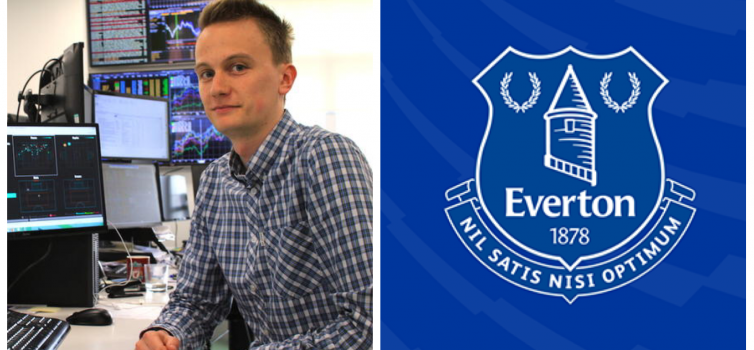From Forest Green to Everton: The analyst/ energy trader

Charlie Reeves started work at Everton at the beginning of July
Written by Simon Austin — July 4, 2017
FOREST GREEN ROVERS are a club that like to do things differently, as evidenced by their 100% vegan menu and plans for a stadium built entirely out of wood.
They are also the only team in the world to have had a data analyst doubling up as an energy trader. Charlie Reeves, 23, was so successful with that dual role that he has now been snapped up by Everton.
From University to the Conference to the Premier League in two years: that's not bad going.
The economics graduate started at Everton’s Finch Farm training ground yesterday and is part of a new breed of football professional to combine statistical analysis with computer coding to provide in-depth insights for managers and coaches.
Reeves' work at Forest Green was mainly based around match analysis – which will also be the case at Everton - although he also helped identify potential signings for manager Mark Cooper. Prior to his move to the North West, he gave TGG some insight into what he does.
“After each game, [data analysis firm] STATS send me a spreadsheet containing every touch of the ball, where it happened on the pitch, the time it happened and who was involved,” he explained.
“I then collate it and use software called SQL to put the information into a big database. After a match I’d delve into that and feed it through our different tools I’ve built, like Tableau, which is data visualisation software. I’ve got all these different charts I can look at – pass maps, shot maps, if a player has gone on a dribble down the right wing. I break down every element of the match and build up a report for the manager and his coaches.
“I’ll start with the basic stuff – possession and passing - then it will get more and more complex, getting into different models we’ve built with the data.”
Marc Flynn from STATS wasn’t surprised Reeves was headhunted by a Premier League club, because he said the depth and quality of his work far exceeded that you would expect to find in the Conference – or even the Championship.
“Charlie isn’t just using traditional data, he’s creating his own variables which are bespoke for his manager and coaching staff,” Flynn told TGG. “That’s a growing area in football, from the Premier League downwards.
“These types of insights wouldn’t be out of place in any of the four tiers; managers would still value them. It’s about moving on from the traditional data set – of number of passes, shots, percentage of possession – and creating coaching context, which is of real use to the coaching staff.

“Charlie is creating his own variables and STATS are creating new data sets and using machine learning to create football context to evaluate build up, counter attacks, keeping possession at the back.”
Reeves was taken on part-time by Forest Green in October 2015 after emailing the chairman and telling him about a programme he had designed at University to predict the results of football matches. The Plymouth Uni graduate was taken on full-time in February 2016, doing four days a week with FGR and one with owner Dale Vince’s energy company, Ecotricity.
“I think I was probably the only energy trader and performance analyst in the world,” he said, which seemed a fair assumption.
The job share worked well though, because he was able to use Ecotricity’s powerful computers and servers and learn from their other analysts and traders.
“Within Ecotricity there were dozens of analysts looking at the energy business,” he said. “They collected tonnes of data on their customers and things like that. That needed to be stored in servers, so we had a big IT team. All the FGR data was stored on the same servers. We were really able to maximise the fact we were owned by a big company.”
However, even if you have the best data analyst in the world, he's virtually worthless if his insights don't influence the work of the manager and coaches. Reeves admits this was a problem when he first worked at FGR.
"The manager, Ady Pennock, didn’t really understand the value of what we were trying to get across," Reeves said. "To be fair, the quality and level of the analysis we were doing wasn’t as good in 2015/16 as it was last season, because I was new and developing the tools and building up banks of data. It took time to get to a level where we could actually see the value of the data analysis.
“Mark Cooper and his assistant Scott Lindsey came in at the beginning of last season and were very receptive to the data. It’s something that’s new to them because through their careers they’ve been League One, League Two level, and I don’t think its that common there, so it was something that’s new to them.
"But they were totally receptive and understood the value of what I was showing them. At the end of the day it’s extra information that’s going to help them improve on a match day so they were totally on board with it.
"Every manager is different. Some are going to want to stick with what they’ve done in the past and what they know and that’s fine.”
Reeves hopes one day to make the transition to Sporting Director at a club, following in the footsteps of Liverpool's Mike Edwards, who began his career as an analyst.
“A lot of the role is heavy coding and statistics," Reeves said. "I think that’s a skillset that will only develop over time in football.”
His own progress from the Conference to Premier League would appear to be testament to that.




-1.png)





